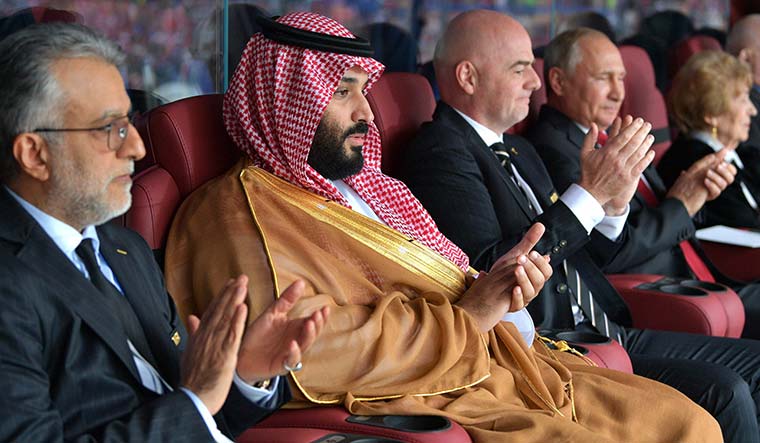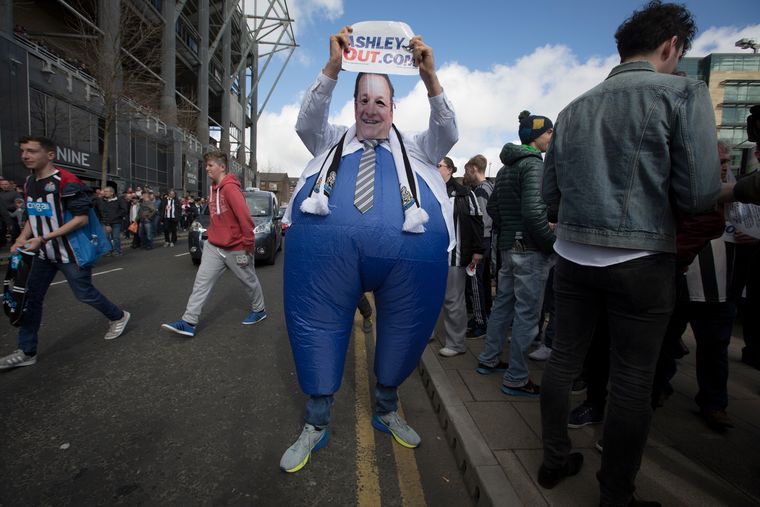IT WAS IN the summer of 1996 that Newcastle United Football Club signed striker Alan Shearer for a world record fee of £15 million. In the previous season, the club had squandered a 12-point lead and finished as runners-up in the Premier League. The champions, Sir Alex Ferguson’s Manchester United, also had pursued Shearer, but the goal machine rejected them in favour of Newcastle—his boyhood club—managed by double Ballon d’Or winner Kevin Keegan. It was time for redemption, and Shearer would lead the charge.
But, despite topping the table early on and giving Manchester United a 5-0 thrashing, the Magpies came second again. Keegan—King Kev to Newcastle fans—resigned halfway through the season. Since then, Newcastle has made it to the top four in the Premier League only twice. It has not won a major domestic trophy since 1955. The lack of success has rankled its fans, who are known as the Toon Army, and they showed visceral hatred for its owner because of his perceived lack of interest in running the club.
Billionaire retail entrepreneur Mike Ashley bought the club in 2007, and there has been unrest ever since. Keegan, who was reappointed as manager in 2008, resigned the same year, openly criticising the board for not giving enough financial support. After massive fan protests, Ashley put the club up for sale three times, but a deal never materialised. The grim Ashley years dragged on. But the new deal has created as much interest as shock. For the majority investor in the consortium that made the offer of £300 million is someone who cannot be ignored.
The consortium is composed of the Public Investment Fund (PIF) of Saudi Arabia, British financier Amanda Staveley and Mumbai-born British billionaires Reuben brothers. Crown prince Mohammed bin Salman is the chairman of the PIF, which would reportedly own 80 per cent of the club. Salman was accused of ordering the murder of journalist Jamal Khashoggi in Istanbul in 2018 and Khashoggi’s fiancee Hatice Cengiz has implored fans of the club to unite against the takeover. Amnesty International has written to the Premier League against allowing sportswashing (use of sports to launder reputations).
But it is the Saudi government’s alleged link to a piracy network that has put the deal in serious doubt. According to The Guardian newspaper, the World Trade Organisation has found that Saudi Arabia is behind a network that offers illegal access to sporting events, including the Premier League. Now the question is whether the Saudi-backed consortium can pass the Premier League’s owners’ and directors’ test. Prospective owners can fail the test if they are proven to be involved in a crime overseas that is also a crime in the UK.
This could be another near-miss for Newcastle. Journalist Oscar Paul, who covers football for The Sun, said most Newcastle fans were excited about the takeover. In fact, 96.7 per cent of 3,400 respondents to the club’s supporters’ trust survey welcomed the takeover. Paul said the fans had been asking the despised Ashley all 13 years to sell the club. “Bit by bit, Ashley sucked the life out of the club, leaving the fan base weary and disillusioned,” he said. “Hope and ambition evaporated long ago, the departure of idolised [manager] Rafa Benitez [in 2019] was the final straw for many. Avoiding relegation and banking the millions that come from Premier League football was all that seemed to matter.”
He said some fans had concerns over the Saudis, but if the deal were to happen, they would “get right behind it”. The consortium’s plans to oversee the regeneration of the city would also help in winning over the fans.
There has been huge Middle East investment in European football, as in the case of Manchester City, which was purchased by the Abu Dhabi United Group and of Paris Saint-Germain by Qatar Sports Investments. Aravind Reghunathan, assistant professor in the department of sport and event management at Bournemouth University, the UK, said if Newcastle’s takeover is completed, a stronger brand than other Gulf-funded clubs can be created. “Because Newcastle is a club with a longer and richer history,” he said.
He felt the new owners would invest heavily in the squad and coaching staff, immediately. “They will have an eye on the renewed interest towards football after [Covid-19],” he said. “So, playing exciting football to leverage that interest might be the first objective for new owners.”
No matter what happens in Newcastle, surely the larger concerns of sportswashing and the fast emerging inter-Gulf rivalry in football cannot be ignored. Muddassir Quamar, an expert on Middle East studies at the Manohar Parrikar Institute for Defence Studies and Analyses, Delhi, said he would not take the term sportswashing seriously. “I don’t think the primary motive for rich capitalists anywhere in the world to invest their wealth in an enterprise is to simply buy some good press for a short term,” he said. “Although this might be an added advantage, it certainly is not the primary motivation. The capitalists go after profit and lucrative return. The rich Gulf businessmen, including members of the ruling families and their close associates, are no different.” He said there was an effort in Saudi Arabia to diversify the economy. In fact, the Saudi Vision 2030 is a framework to reduce the country’s dependence on oil. And an investment in the world’s richest football league thus makes sense.
Quamar said the question of human rights violations, though valid, should be seen within the regional context where few states have a stellar record. “Within Saudi Arabia, the situation has certainly improved, but a lot needs to be done for legal reforms and judicial autonomy,” he said. He said Qatar-based beIN Sports opposed the takeover citing the piracy link more because of business concerns than geopolitical rivalry. “I have not come across any evidence that the Qatari government or ruling family is involved,” he said.
Sports has always been a lucrative investment option. Apart from profits, it also has the potential to help the image of the investor, thanks to the community’s involvement as well as the raw emotions associated with the outcomes. It follows naturally that the rulers would also want their share of the pie. But, should there be rules prohibiting at least heads of states from making (directly or indirectly) such investments? As Quamar put it: “Politics, including global politics, is intertwined with business and business of sports and sporting events, and I don’t think it can be completely separated, even by enacting laws.”



